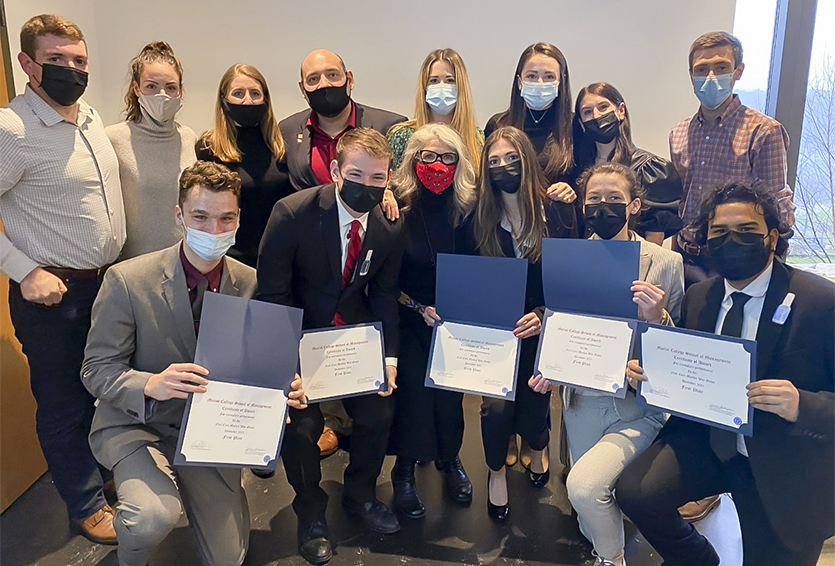The Winning Edge: War Games Come to the Classroom

March 29, 2022 — Perhaps you’ve noticed how often military terms are used when we talk about business. We say, for example, that managers are “caught off guard” when profits fall and will surely “take the flak” from investors. And don’t we all hope to “make a killing” in the stock market?
Given this linguistic synchrony, it’s not surprising that war games are now utilized by companies across the globe. In the military, officers use war games to test concepts and master battlefield skills. Business war games require executives to simulate strategic business moves — and countermoves — made by their own company as well as by their competitors in the same industry.
A relatively recent development in the commercial arena, war gaming “is not a methodology that is usually employed with undergraduates,” says School of Management Professor of Strategy Dr. Helen Rothberg. Nonetheless, in 2016 she began using this exercise as a teaching tool in her BUS 477 Management Strategy and Policy capstone class. The game centers on an industry question, which student teams — representing competing companies — create strategic plans to address. Throughout the semester, the teams participate in Q&A sessions with sponsoring executives who work for one of the (unidentified) companies in their focus industry. During the two-day finale at the semester’s end, each team presents its strategic plan in detail; responds to questions from the executives, alumni, and classmates; and creates a retort presentation illustrating what they learned from competitors. “As a rule of thumb,” says Rothberg, “the team that doesn’t adjust its strategy to reflect new intelligence loses the war.”
Digital advertising, home entertainment, defense, quick service restaurants, and enterprise technology are a few of the industries that have been scrutinized. And the takeaway from the games – for both students and participating executives — has been overwhelmingly positive. “I sponsored a war game [in 2017] focused on premium audio and how home entertainment would evolve in the smart home,” says Heather Hallenbeck, former director of corporate insights, strategy, and innovation at Bose Corporation. “The students provided extensive industry and competitive analysis and on-site debate with strong actionable recommendations. It was a huge success for Bose to learn the millennial perspective on the industry and key brands. It was so impactful we invited Dr. Rothberg and the winning team to present their findings directly to our C-suite executives.”
Alumna Marissa Casazza ’17, digital and operational marketing manager at L'Oreal, took part in the fall 2021 war game, which examined the cosmetics industry. “The best — and we think the most critical — part of this project is the ability to switch your recommendation after feedback is given,” she said. “Forcing students to be agile and strategize on the fly will set them up for success in the future. Another critical part is the Q&A segment: Conditioning students to be able to take in a question, digest it, and spit out a thoughtful answer is very important. Most college courses do not offer this level of real-world preparation.”
“Capping with Dr. Rothberg was one of the best decisions I made at Marist," says Jake Ruthazer '21, a corporate and investment banking analyst at J.P. Morgan. “BUS 477 helps students learn about strategic management by applying their business studies to real-life problems faced by executives at Fortune 500 companies. I am extremely grateful for this class because I apply the skills and processes I learned on a daily basis.”
Spencer Hogan ’20 claims that he “cannot overstate the value” of participating in Rothberg’s war game class. “Judging by my interactions with peers in the industry,” says the senior strategy analyst at Accenture, “it is highly unusual for undergraduate institutions to unleash students into the workforce who have a comprehensive understanding of how to think and speak like a corporate strategist. I walked into my consulting career with a tool kit pulled directly from this capstone experience that allowed me to hit the ground running in building strong client relationships and managing others within year one at the firm.”
“As a former participant and now a sponsor, I can confidently say the value this exercise brings to both students and sponsor companies is tremendous,” says Raymond Tetreault ’17, a revenue operations analyst at an alternative energy company sponsoring the spring 2022 war game. “I won’t sugarcoat it: Prof. Rothberg’s constant challenging of our assumptions and beliefs was hard. It forced me to think differently and constantly question my current understanding. After this experience, I was able to walk into job interviews stating I hadn’t just done the work in a classroom, but in the real world, for a real client, and was able to deliver real value. That alone helped to differentiate me from other graduates and land my first job post-college.”



